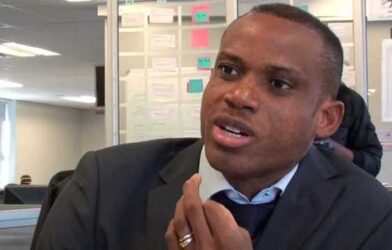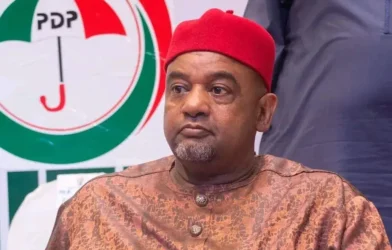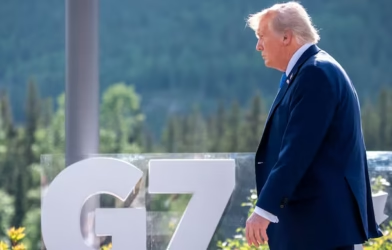President Bola Ahmed Tinubu came to political office against the wave of optimism amongst members of his support base that his administration would deliver what Mr. Tinubu himself calls ‘renewed hope’.
A periscopic view and analysis of the concept of ‘renewed hope’ would reveal that the newly sworn-in Nigeria’s President is well aware that his predecessor, Muhammadu Buhari literally brought Nigeria down to its knees in all facets of governance.
To underscore this viewpoint, we just need to note that the loquacious erstwhile national chairman of the ruling political party- the All Progressive Congress, Mr Adams Oshomole has stated that he is ceased with the knowledge of a destroyed nation handed over to Mr. Tinubu by Mr. Buhari, and his views on this are very explicitly. Oshiomhole is now a the senator representing the Edo North Senatorial District, and he just stated that the government of President Bola Tinubu inherited a terrible economic situation.
Oshiomhole stated this on Tuesday during an interview session with journalists shortly after meeting with the Vice President, Senator Kashim Shettima, behind closed doors at the Presidential Villa, Abuja.
According to the former National Chairman of the ruling All Progressives Congress (APC), some of the decisions taken by the current administration are the first step towards revamping the economy.
He added that President Tinubu and his deputy had shown courage and determination to stop the corruption of the subsidy regime and in the Central Bank of Nigeria (CBN), while appealing to Nigerians to be patient. (Channels TV). This admission of a battered nation is what millions of Nigerians are already well aware and this was the reason it is a shock that the same All Progressives Congress that destroyed Nigeria from all facets were returned as ‘winner’ of the controversial 2023 Presidential election. Be that as it may, the question however is whether President Tinubu has the will- power or rather the political will to deliver on his mantra of ‘renewed hope’.
One area of Nigeria’s national life that has not honestly been tackled by the immediate past administration is on public officials’ deep rooted and massive thefts of public fund. The accountants General of Nigeria under President Buhari’s nose, allegedly stole over N90 billion from the National treasury and both him and his fellow alleged thieves are all not getting the desired legal reprimand because majority of those he listed as co-suspects worked for the election of President Bola Ahmed Tinubu.
And also to make matters worst, the agencies created by law to fight corruption have also become political weapons of attacks against political opponents of the President who is the appointing authority of the heads of both the Economic and Financial Crime Commission (EFCC) and the Independent Corrupt Practices and other offences Commission (ICPC).
Therefore both agencies have become the political attack dogs of the president in the immediate past administration just as it is beginning to manifest under just three months old administration of Mr. Bola Ahmed Tinubu. The current boss of the central administration has already shown his true colour that he will not wage war against corruption by first and foremost, dismantling the hierarchy of EFCC for daring to go after him when he wasn’t in government.
Specifically, Mr. Tinubu has kicked out the chairman of EFCC Bawa Abdulrasheed who investigated him (Tinubu) over alleged corruption and this embattled young chairman of EFCC has languished in DSS cell for a month. Department of State Services has become the official attack dogs of Bola Ahmed Tinubu. This security agency has gone about arresting Bawa and Godwin Emefiele the suspended CBN governor for daring to change the Naira notes which allegedly affected the ability of Bola Ahmed Tinubu to circulate money to his political loyalists with the aim of winning the election seamlessly. Tinubu fought tooth and nail to be able to get cash for his election and so the first person he got kicked out was the CBN governor who has been detained for over a month. These acts of arbitrariness amount to corruption since is dovetails into abuse of power which the Nigerian constitution absolutely prohibits in section 15(5).
Besides the political attack orchestrated by the current president against the then chairman of EFCC whom he Tinubu inherited from his predecessor but has now kicked him out and detained him arbitrarily without trial, Tinubu’s appointment of erstwhile governors with massive corruption baggage tells a profound story showing one message that the era of anti-corruption in the real sense of it is gone.
The former governors of Kebbi and Zamfara States who have accusations of their involvement in massive act of corruption have found favour in the eyes of president Tinubu as his ministers and Bawa Abdulrasheed who hitherto was investigating the duo is languishing in DSS cell.
President Bola Tinubu nominated as minister, Atiku Bagudu, the man who helped late dictator Sani Abacha steal and launder billions of dollars belonging to Nigeria.
Mr Bagudu, 61, was a federal lawmaker before he served as governor of northwestern Kebbi State for eight years. He is a household name in the All Progressive Congress (APC) and a political ally of the president.
Both men were not always allies. In fact, at the time Mr Bagudu was helping Mr Abacha steal Nigeria dry, Mr Tinubu was financing some political and civil society actors demanding the dictator’s exit. Mr Tinubu had to go into exile due to fears the dictator wanted to kill or imprison him.
However, the formation of the APC in 2013 and its eventual electoral success in the 2015 general elections brought both men together, a relationship that was solidified when Mr Tinubu sought the APC presidential ticket last year., reports a newspaper.
Few days back, Mr Tinubu sent the name of Mr Bagudu and 18 others to the Senate for confirmation as ministers.
Mr Bagudu had since 2003 admitted to financial irregularities when he agreed to return about $163 million to Nigeria to avoid extradition to Jersey from the US.
Since getting into the corridors of power in 2011 as a senator, Mr Bagudu has remained active in politics. Last year, he played a major role in the APC’s selection of Mr Tinubu as its presidential candidate for the 2023 presidential elections. Mr Bagudu was also a key player in Mr Tinubu’s presidential campaign council.
While Messrs Tinubu and Bagudu’s political romance continues, the Nigerian government is still trying to recover some of the insane amounts of money that Mr Abacha stole from Nigeria, most with the connivance of Mr Bagudu.
The systematic plunder of Nigeria by the Abacha family with the help of Mr Bagudu is reckoned to be one of the worst cases of kleptocracy and offshore shenanigans in the world.
The media reported that between 1998, when Mr Abacha suddenly died, and 2020, 3.6 billion U.S. dollars have been recovered from the Abacha family and Mr Bagudu, now a minister-designate.
The money-laundering operations Mr Bagudu ran on behalf of Mr Abacha are well-documented in suits filed in the United States and the Bailiwick of Jersey, a British Crown dependency in the Channel Islands.
The $23.5 million Abacha loot recovered last year by the UK’s National Crime Agency (NCA) was forfeited by Mohammed Abacha and Mr Bagudu’s offshore company Mecosta Securities Inc.
While he was serving as governor of Kebbi state, the United States and Jersey authorities repatriated 308 million U.S. dollars stolen and laundered by Mr Bagudu, PREMIUM TIMES reported.
Similarly, the 163 million U.S. dollars recovered from Jersey in 2003 directly involved Mr Bagudu, who then negotiated a deal with the US and Jersey to return the funds to Nigeria in exchange for Jersey’s withdrawal of an extradition request and his free return to Nigeria.
He spent six months in American federal prison in Houston while awaiting extradition to Jersey. The deal to return the $163 million was to avoid that extradition.
It was gathered that Mr Bagudu reached a settlement with the Olusegun Obasanjo administration in 2003 to drop all outstanding civil and criminal claims against him, according to US court filings seen by PREMIUM TIMES.
Mr Bagudu according to media reports was involved with the offshore front companies and bank accounts – from the British Virgin Islands to Ireland, Switzerland, England, Guernsey, and Jersey – used to steal and launder billions of dollars by the Abacha regime. He was either a director, signatory on accounts or prime beneficiary of such companies, according to US court documents and incorporation filings from the Pandora Papers leaks. The next person appointed a minister is the immediate past governor of Zamfara State Matawalle.
It must be noted that the EFCC accused Governor Matawalle of diverting about N70 billion he sourced as loan from a bank purportedly for executing projects across the local governments in Zamfara State.
However, a media aide to Governor Bello Matawalle of Zamafara State said then that his principal would not react to the allegations of N70 billion fraud levelled against him by the Economic and Financial Crimes Commission (EFCC).
It was reported by media earlier that the EFCC was investigating the governor for allegedly diverting about N70 billion he sourced as loan from a bank purportedly for executing projects across the local governments in the state.
When contacted Mr Matawalle’s Special Adviser on Media, Publicity and Enlightenment, Zailani Bappa, said the governor was at the tail end of his tenure and would not respond to EFCC’s allegations.
“The governor is finishing his term in two weeks’ time. I do not see any reason why he should react to EFCC’s allegations,” Mr Bappa said in a short telephone interview. However, Matawalle then turned back and accused the then EFCC’s chairman Bawa Abdulrasheed of demanding $2 million bribe from him.
Mr Bappa who said he was learning of the allegations against his principal from this reporter, noted that the EFCC as a federal government agency was at liberty to accuse anyone of wrongdoing.
The EFCC’s announcement of the investigation of Mr Matawalle came barely 24 hours after the outgoing governor had attacked the commission.
Mr Matawalle had on Wednesday advised the EFCC to extend its investigations to Nigeria’s presidency and other top federal functionaries instead of focusing attention on outgoing governors.
He also asked the EFCC chairman, Abdulrasheed Bawa, to come clean on disposal of seized proceeds of corruption as well as plea bargain procedures on his watch.
Reacting to the governor’s statement, Osita Nwajah, EFCC’s Director of Public Affairs, on Thursday, in Abuja, disclosed that Mr Matawalle whose four-term as governor ends on 29 May, allegedly diverted N70 million from the Zamfara State coffers.
Alerting Nigerians to what he described as the plots by some persons to discredit the anti-corruption agency’s efforts in tackling sleaze, Mr Nwajah said Mr “Matawalle’s outburst is product of paranoia- an uncomfortable exertion arising from the heat of EFCC’s lawful activities.”
He said every political transition era since EFCC’s creation has been trailed by vicious attacks against the agency by persons who are under its investigation.
He explained that the governor’s tirade had nothing to do with EFCC’s transparency in assets recovery and disposal.
“Contrary to the claims by Matawalle, the Commission supervised an asset disposal exercise that was widely acclaimed as the most transparent in the country’s history. Proceeds of the open and transparent exercise have since been remitted into the coffers of the Federal Government, and are being deployed in the provision of infrastructure for Nigerians.”
The commission further accused Mr Matawalle of hypocrisy for criticising its plea bargain procedure of “which he has been a beneficiary.”
Mr Nwajah revealed that Mr Matawalle’s investigation by the commission “is the source of anxiety in Government House, Gusau, with the governor in mortal dread of his fate once he steps down as governor on May 29.”
Mr Matawalle’s tenure in office is marked by escalation of insecurity with bandits freely kidnapping for ransom and sacking communities of residents. But as the anti-corruption war is in fast decline, the then ERCC Chairman who accused Matawalle of corruption is languishing in the detention of DSS whereas the man he accused of theft of public fund has been made a federal minister under Tinubu. How then can anyone be hopeful that any sort of war against corruption is going on under Tinubu? Also, the way President Bola Ahmed Tinubu installed his boys as leaders of the 10th session of the National Assembly smacks of corruption. Already, early signs that the National Assembly is a house of corruption have emerged with the releases of humongous fund to buy exotic cars that are way too expensive particularly at a time that Tinubu hiked the price of fuel to a level that millions of Nigerians can’t afford and this is because the government withdrew the subsidy paid for petrol.
The increasing public spending on the acquisition of exotic cars for federal lawmakers has raised some concern after it emerged that the National Assembly has spent a whopping sum of N53.7 billion on cars for elected lawmakers in the last 12 years.
The media reports that from 2011 to 2023, a total sum of N53.7 billion would have been spent on purchase of vehicles for federal lawmakers alone.
This came as some of Nigeria’s major civil society organisations (CSOs) have kicked against such spending, arguing that it is not “justifiable and sustainable.”
It was gathered that the lawmakers, both senators and members of the House of Representatives, get exotic cars every four years, running into billions of car in cost.
From the 7th Assembly starting from 2011 to the 10th Assembly starting in 2023, the sum of N53.7 billion would be spent on cars.
It was learnt that in the 7th Assembly (2011 -2015), a total of N3.5 billion was spent on cars for only serving lawmakers. The figure rose to N4.7 billion in the 8th Assembly (2015 -2019).
During the 9th Assembly (2019 – 2023), the amount spent for lawmakers’ exotic cars was N5.5 billion, about N800 million increment from the preceding year.
The figure would record a gargantuan jump in the 10th Assembly (June 2023 – June 2027) with a whopping N40 billion proposed for the purchase of vehicles for the lawmakers.
The President of the Nigerian senate, Godswill Akpabio, has made a gaffe during plenary when he mistakenly revealed that money has been sent to senators to ‘enjoy’ their recess.
A video clip showing Mr Akpabio making the blunder has gone viral on social media.
The clip surfaced on Wednesday.
The incident reportedly happened on Monday after the senators concluded the screening and confirmation of President Bola Tinubu’s ministerial nominees.
The senators later adjourned plenary to 26 September.
The gaffe
Mr Akpabio, who forgot that the proceeding was being streamed live, began to address his colleagues before adjournment motion was moved at the end of the Senate’s ministerial screening.
“In order to enable all of us to enjoy our holidays, a token has been sent to our various accounts by the Clerk of the National Assembly,” he said.
The senate president was immediately informed by his colleagues that he was speaking on live television.
Upon realising the seriousness of his remarks, he quickly announced its withdrawal.
“I withdraw that statement,” he said.
“In order to allow you to enjoy your holiday, the senate president has sent prayers to your mailboxes to assist you to go on a safe journey and return,” Mr Akpabio rephrased the comment, apparently to correct what was considered an embarrassment.
The amount that was sent to the senators remains unknown. However, the salaries and allowances of National Assembly members are often shrouded in secrecy.
The ‘holiday’ allowance Mr Akpabio said was paid to lawmakers is unknown to the law. The remuneration package approved for lawmakers by the Revenue Mobilisation, Allocation and Fiscal Commission (RMARC) has no ‘holiday’ allowance or token provision.
But the lawmakers are entitled to recess allowance under the law, which is 10 per cent of the annual basic salary of each legislator, and is paid once a year.
Mr Akpabio may have, in his comment, referred to that ‘recess allowance’ as “holiday allowance”.
However, Nigerian lawmakers are infamous for drawing illegal allowances from public funds and padding annual budgets to enrich themselves illegally.
Tinubu’s body language shows that his government is an embodiment of corruption.
EMMANUEL ONWUBIKO is head of the HUMAN RIGHTS WRITERS ASSOCIATION OF NIGERIA and was NATIONAL COMMISSIONER OF THE NATIONAL HUMAN RIGHTS COMMISSION OF NIGERIA.












Comments are closed